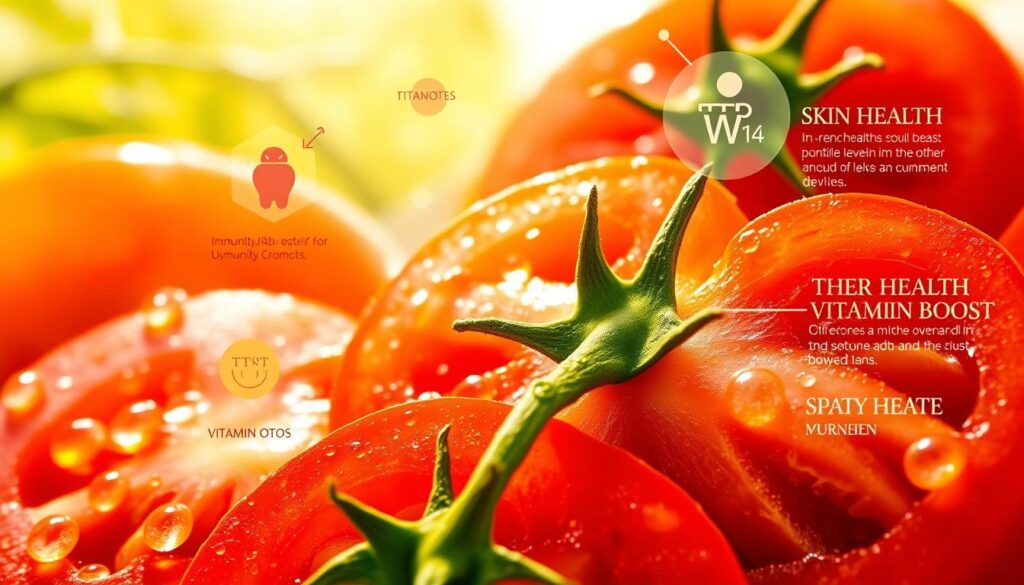Have you ever wondered why tomatoes are so popular in many diets? They’re not just for their bright color and taste. Tomatoes are full of vitamins and antioxidants that boost your health in big ways.
As you learn about tomato’s benefits, you’ll see how they help your heart, fight cancer, and protect your skin. Let’s explore how this food makes your diet better.
Key Takeaways
- Tomatoes have a high water content of about 95%, making them hydrating.
- One medium-sized tomato offers approximately 28% of the RDI for Vitamin C.
- Rich in antioxidants, tomatoes contain lycopene, which offers heart health benefits.
- Consumption of tomatoes can significantly lower the risk of heart disease and high blood pressure.
- Both fresh and processed tomato products provide valuable nutrients, with some differences in lycopene content.
- Tomatoes are low in calories but high in dietary fiber, which aids in digestion.
- Incorporating tomatoes into your meals can help enhance overall nutrient absorption.
Introduction to Tomatoes
Tomatoes are a key ingredient in many dishes around the world, loved for their taste. Even though we often think of them as vegetables, they are actually fruits. They come in many colors and shapes, adding joy to our meals and bringing nutritional advantages.
Tomatoes are packed with vitamins and antioxidants, which are good for our bodies. They contain lycopene, a powerful antioxidant that fights off harmful free radicals. Eating tomatoes may help prevent some cancers, like lung and prostate cancer.
Tomatoes also help keep our hearts healthy and can lower cholesterol levels. They are full of potassium, which is good for our hearts and helps keep fluids balanced. Plus, their water and fiber content helps with digestion, making them a natural laxative.
Tomatoes are also very versatile in cooking. You can enjoy them fresh, cooked, or in sauces. When you eat tomatoes with healthy fats like olive oil, your body absorbs more nutrients. This makes tomatoes a great choice for a healthy diet.
Tomatoes: Origin and History
The tomato, known as Solanum lycopersicum, started in western South America. People there grew it about 7,000 years ago. This was the start of the history of tomatoes.
By 500 BC, tomatoes were grown in southern Mexico. This showed how important they were in local farming.
Spanish explorers brought tomatoes to Europe in the 16th century. This was a big change in food history. At first, people grew them for looks, not for eating.
In Italy, tomatoes became key for sauces, pizzas, and more. Many types of tomatoes were created to suit different tastes and uses.
Now, there are thousands of tomato types. They vary in size, shape, color, and taste. Farmers breed them to improve flavor and nutrition.
Tomatoes are mostly grown as annuals. They can’t handle frost well. But, they grow well in greenhouses, giving gardeners more time to enjoy them.
The tomato’s journey from its start to worldwide love shows the power of farming and cooking. Knowing where tomatoes come from helps us see their amazing journey through time and cultures.
Nutritional Overview of Tomatoes

Tomatoes are a great addition to your diet, full of vitamins and minerals. They are packed with vitamin C and potassium, which are good for your health. Knowing the tomato nutrition facts shows how they can improve your well-being.
Tomatoes Vitamins and Minerals
One medium-sized raw tomato has a lot of nutrients:
- Calories: 23
- Carbohydrates: 5 grams
- Protein: 1 gram
- Fat: Less than a gram
- Fiber: 1.5 grams
- Vitamin C: 17 milligrams (19% of the daily value)
- Vitamin K: 10 micrograms (8% of the daily value)
- Potassium: 296 milligrams (6% of the daily value)
- Folate: 19 micrograms (5% of the daily value)
Caloric and Macronutrient Breakdown
Tomatoes have only 23 calories per medium-sized one. They are a great choice if you’re watching your calories. Here’s a breakdown of their macronutrients:
| Nutrient | Amount per Tomato |
|---|---|
| Calories | 23 |
| Carbohydrates | 5 g |
| Protein | 1 g |
| Fat | Less than 1 g |
| Fiber | 1.5 g |
| Vitamin C | 17 mg |
| Vitamin K | 10 µg |
| Potassium | 296 mg |
| Folate | 19 µg |
Tomatoes are about 95% water, making them hydrating and fiber-rich. They are a healthy choice for your meals, bringing many benefits.
Tomato Benefits and Advantages: High in Vitamins

Tomatoes are not just tasty; they’re also packed with vitamins. They’re rich in vitamin C, which is great for your health. Tomatoes also have vitamins A and K, which help keep you well.
Rich in Vitamin C
Tomatoes are full of vitamin C. A medium tomato has about 17 mg of it, which is 28% of what you need daily. Vitamin C boosts your immune system and helps your body use iron better.
It also fights off harmful free radicals and lowers the risk of serious diseases.
Source of Vitamin A & Beta-Carotene
Tomatoes are also a good source of vitamin A, thanks to beta-carotene. This antioxidant helps your eyes, skin, and immune system stay healthy. Even a small tomato can give you a lot of vitamin A.
This vitamin is key for your overall health.
Presence of Vitamin K
Vitamin K is also found in tomatoes. It’s important for blood clotting and bone health. Eating tomatoes regularly can help your heart and help your body heal.
The Power of Lycopene in Tomatoes

Lycopene is a strong antioxidant found mainly in tomatoes. Its bright red color shows its importance. Tomatoes are full of lycopene, which helps keep cells healthy and fights off diseases.
Health Benefits of Lycopene
The health perks of lycopene in tomatoes are many and proven. Eating this antioxidant can:
- Boost fertility in healthy young men by up to 40% with 14 milligrams daily.
- Lessen UV skin damage from sunlight by about 40% with tomato paste in your diet.
- Help with pain, similar to ibuprofen, for nerve pain.
- Stop some cancer cells from growing, like prostate and lung cancers.
Lycopene and Heart Health
Lycopene is great for the heart. It helps lower heart disease risks. Here are some heart health benefits:
- It lowers bad cholesterol and raises good cholesterol, helping the heart.
- It helps keep blood pressure in check.
- People with high lycopene levels have a 39% lower risk of heart disease death.
- It also lowers the risk of heart disease complications by 17–26%.
Health Benefits of Tomatoes

Tomatoes are a superfood with many health benefits. Adding them to your meals can greatly improve your health. They are packed with nutrients and beneficial compounds.
Protection Against Heart Disease
Tomatoes are good for your heart. They contain lycopene, an antioxidant that fights inflammation and may lower cholesterol. Studies show that eating tomatoes can lower your risk of heart disease by 14%.
So, tomatoes are not just tasty. They are also great for your heart.
Potential Cancer Prevention
Tomatoes can help prevent cancer. Eating lots of tomatoes may lower the risk of prostate, breast, and lung cancers. This is thanks to lycopene, which boosts your body’s defense against cancer.
Tomatoes may also help prevent lymphoma. They are a powerful tool in the fight against cancer.
Skin Health and Sun Protection
Tomatoes are good for your skin. They are mostly water, which keeps your skin hydrated. Lycopene in tomatoes also protects your skin from the sun.
This makes tomatoes a tasty way to keep your skin healthy and strong against the sun.
Tomatoes Vitamins and Antioxidant Properties

Tomatoes are not just tasty but also full of good stuff. They have nutrients and antioxidants that are great for health. Knowing about the antioxidants in tomatoes can help you see their benefits.
Benefits of Antioxidants in Tomatoes
The antioxidants in tomatoes are key to staying healthy. They help protect cells and lower disease risks. Lycopene and vitamin C are big players in these benefits.
For example, one medium tomato has 17 grams of vitamin C. That’s 19% of what adults need every day. Vitamin C fights off free radicals, which can slow aging.
Impact on Inflammation and Immunity
Eating tomatoes can help reduce inflammation. Their antioxidants keep the immune system in check. This is good for overall health.
Studies show tomatoes boost the immune system. Drinking tomato juice daily can improve cholesterol and fertility. Adding tomatoes to your diet can strengthen your immune system and help control inflammation.
| Nutrient | Amount per Medium Tomato | % Daily Value |
|---|---|---|
| Vitamin C | 17 mg | 19% |
| Potassium | 296 mg | 6% |
| Calories | 11 kcal | – |
| Fiber | 0.8 g | – |
| Carotene | 279 mcg | – |
Tomato Consumption: Raw vs. Cooked

Exploring tomato consumption means looking at raw vs cooked tomatoes. The way you prepare tomatoes changes their nutritional value. This affects both health benefits and how well your body can use the nutrients.
Nutritional Differences
Raw tomatoes are mostly water, with about 95% hydration. A 100-gram serving has 18 calories, 0.9 grams of protein, 3.9 grams of carbs, and 2.6 grams of sugar. They are packed with vitamin C, giving you up to 28% of your daily needs.
Cooking tomatoes can make some nutrients more available. For example, it boosts lycopene, a heart-healthy antioxidant. Raw tomatoes keep vitamin C, but cooking can lower water-soluble vitamins.
- Cooking tomatoes significantly increases the absorption of lycopene, a powerful antioxidant linked to heart health.
- Raw tomatoes retain vitamin C; cooking can reduce water-soluble vitamins.
- Cooking techniques for tomatoes, like roasting or stewing, can concentrate flavor and enhance their nutrient profile.
Maximizing Nutrient Absorption
To get the most from tomatoes, pair them with healthy fats like olive oil. This helps your body absorb lycopene better. Cooking tomatoes can make lycopene up to 2000% more available, thanks to cast iron cookware.
This method boosts nutrient absorption. It makes it easier for your body to use the nutrients in tomatoes.
| Preparation Method | Nutrient Highlights |
|---|---|
| Raw Tomatoes |
|
| Cooked Tomatoes |
|
Tomatoes and Dietary Fiber

Tomatoes add flavor to your meals and are packed with dietary fiber. This fiber is key for a healthy gut and regular bowel movements. Adding dietary fiber in tomatoes to your diet can boost your health.
Role in Digestive Health
The digestive health benefits of tomatoes come from their fiber. This fiber includes both types: soluble and insoluble. Soluble fiber helps your body absorb nutrients better. Insoluble fiber makes your stool bulkier, helping prevent constipation.
Eating tomatoes regularly keeps your bowels healthy. It may also lower the risk of stomach problems.
Benefits for Weight Management
For those trying to manage their weight, tomatoes are a great choice. They are low in calories but high in fiber. This makes them a perfect snack for weight watchers.
Tomatoes’ fiber keeps you full longer. This reduces the need to eat more calories. It helps in losing weight effectively.
Safety and Considerations

Tomatoes are usually safe and good for you. But, some people might face problems with tomato allergies or sensitivity. It’s key to know about these issues to stay healthy.
Allergy and Sensitivity Issues
Some folks have tomato allergies, often linked to grass pollen sensitivity. This can cause mouth and throat itchiness. If you’re allergic, you might need to skip raw tomatoes or products with them.
If you think you’re having a reaction, talk to a doctor. They can figure out if it’s an allergy or something else.
Possible Side Effects
Tomatoes might not be good for everyone, like those with heartburn or GERD. Their acidity can make heartburn worse. Some might get migraine headaches from eating tomatoes.
If you have health issues, be careful with tomatoes. They could make things worse. Always check with a doctor if you’re worried about how tomatoes affect you.
| Potential Issues | Symptoms | Recommendations |
|---|---|---|
| Tomato Allergies | Itching in mouth/throat | Avoid raw tomatoes; consult healthcare provider |
| Sensitivity to Tomatoes | Digestive discomfort | Limit intake; monitor reactions |
| Gastroesophageal Reflux | Heartburn | Avoid acidic foods; manage portion sizes |
| Migraine Triggers | Headaches | Track food intake; consult professional |
Incorporating Tomatoes into Your Diet

Tomatoes are versatile and full of health benefits. They’re easy to add to your daily meals. You can use them in salads, sauces, soups, and snacks. This makes your meals taste better and be more nutritious.
Creative Ways to Use Tomatoes
- Add fresh tomatoes to omelets for a burst of flavor.
- Include tomatoes in salads to boost hydration and vitamins.
- Create a homemade tomato sauce to serve with pasta or pizza.
- Prepare roasted tomatoes as a side dish or topping for sandwiches.
- Make a refreshing tomato and cucumber salad, perfect for hot days.
Cooking Techniques to Enhance Nutrition
Using the right cooking methods can boost tomato nutrition. Roasting or stewing tomatoes makes their flavors and antioxidants stronger. Adding healthy fats like olive oil helps your body absorb more nutrients.
Here are some tips for preparing tomatoes:
| Cooking Method | Nutritional Benefits |
|---|---|
| Roasting | Increases lycopene concentration, enhances flavors. |
| Stewing | Softens the texture and allows for maximum nutrient release. |
| Blanching | Peeled tomatoes for sauces, retaining nutrients beneficially. |
| Raw | Preserves vitamin C and hydration from the water content. |
Adding tomatoes to your recipes is easy and rewarding. They can make your meals healthier and tastier. By using these tips, you can enjoy a healthier lifestyle with delicious tomato dishes.
Conclusion
Tomatoes are a great food, full of vitamins and antioxidants. They help prevent diseases and improve your skin and digestion. They are also very refreshing and hydrating, perfect for hot days or after working out.
Tomatoes are rich in vitamin C, vitamin A, and fiber. These nutrients boost your immune system and help your heart. Adding tomatoes to your meals can greatly improve your health.
How you eat tomatoes matters for their health benefits. Enjoy them raw in salads, cooked as sauce, or blended into soups. Tomatoes add flavor and nutrients to your meals, making them healthier and more enjoyable.

